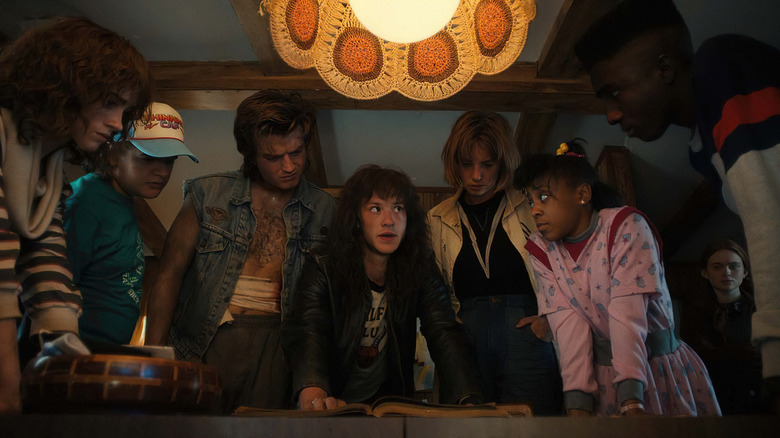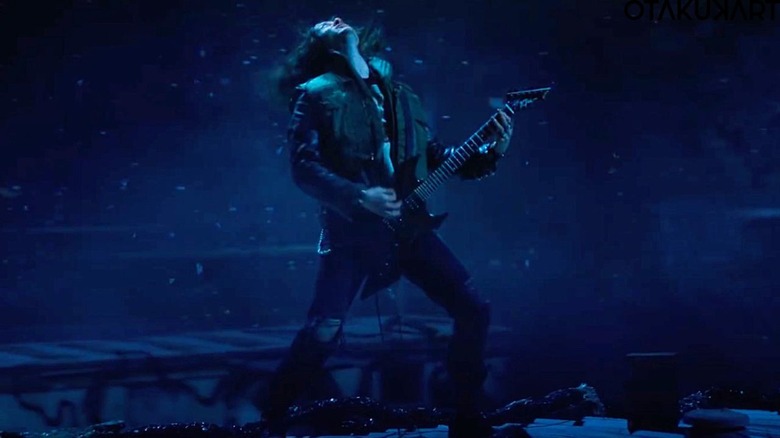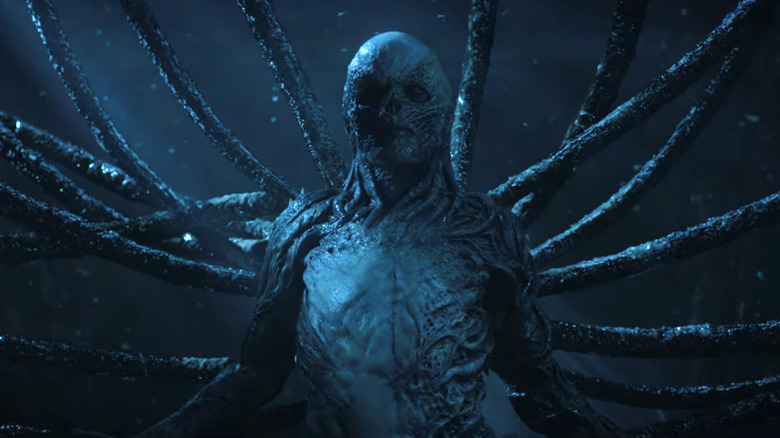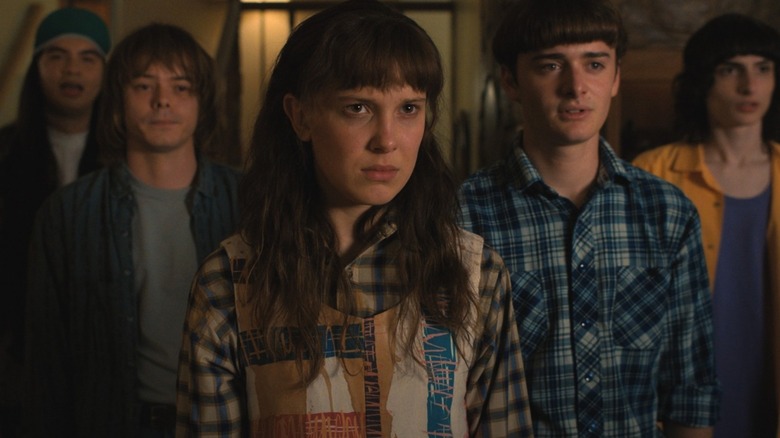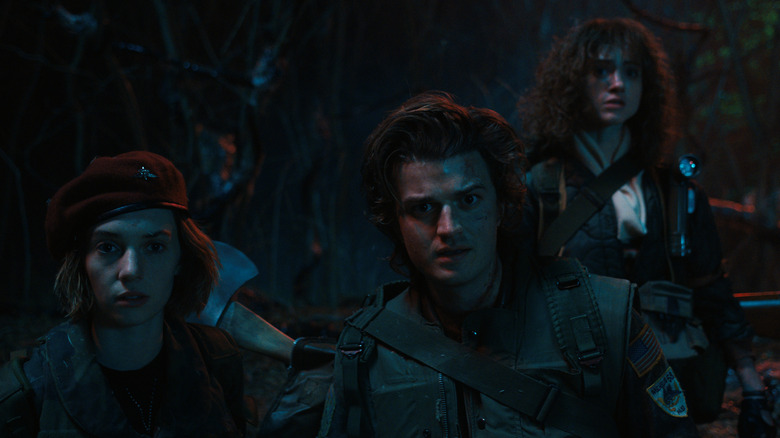Stranger Things 4 Felt Like An Uninspired D&D Game
This post contains major spoilers for the final two episodes of "Stranger Things" season 4.
From the moment it premiered, "Stranger Things" became a smash hit, with its buffet of '80s nostalgia and references to everything from Amblin movies to Stephen King. Together with "It: Chapter One," the show helped cement the 2010s as the second coming of the 1980s.
But the show wasn't just a series of references to the biggest and most popular things of the decade, no. It was also a deeply nerdy show made by people who loved the world of video games, fringe music, and most of all, Dungeons & Dragons. From naming its bad guys after D&D monsters to prominently showing the main characters playing the TTRPG, the structure of each season as arcs in an overall campaign of the game, splitting the party and sending them on side quests before reuniting to fight the big bad.
But like many D&D campaigns, "Stranger Things" has lost its steam, with the Dungeon Master (the showrunners) getting increasingly more obsessed with the mythology they created rather than with the story they are telling with their players.
Never running out of hit points
Even before the Demogorgon started terrorizing the town of Hawkins, Indiana, audiences fell in love not with the mythology, but with the characters of "Stranger Things." By season 4, it is clear the DM did the same and is now unable to truly threaten the lives of the characters.
Volume 2 of season 4 is overly long and overstuffed with ideas and set pieces. And as incredible as they are, the stakes are rather low. Multiple interviews from the cast and crew teasing a bloody massacre in the finale with the darkest and most heartbreaking episode aren't a substitute for actual stakes. Instead we should have listened to Millie Bobby Brown, who joked that Matt and Ross Duffer are "sensitive Sallies who don't want to kill anybody off."
Watching the finale, it becomes clear the Duffer brothers have become like a DM who is just too close with their D&D group of friends to dare kill off their characters. Sure, Max (Sadie Sink) is in a coma, but if you truly believe she is not being set up for a surprise return at the last minute in the fifth and final season, you haven't been paying attention.
So what does the DM do if they can't bring themselves to kill the player characters? They bring yet another lovable NPC the players (and audience) will fall in love with and use them as a proxy for actual stakes, killing them off brutally in the finale. Like Bob (Sean Astin) or Sergei (Alec Utgoff) before, Eddie (Joseph Quinn) was another incredibly cool character that deserved to be a core part of the main cast, but instead got the short end of the stick and died a rather mediocre death after one hell of a metal performance.
A good hero is only as good as its villain
Just as the showrunners wouldn't truly get rid of a main character, they also didn't want to get rid of their villain. Vecna (Jamie Campbell Bower) is without a doubt the best villain the show has done yet. Unlike the Demogorgon or the spider monster, Vecna could actually talk and interact with the characters, mess with their heads, toy with and taunt them — all while having a backstory that is relatable and connected to both the characters and the larger mythology.
So what happens? The DM falls in love with their cool and memorable villain and has a hard time getting rid of him. In the final episode it seems like our heroes finally vanquish the monster, with a little help from Kate Bush, as they shoot and burn Vecna straight to hell. Except, of course, that the sorcerer manages to elude death and gets away by pulling a Michael Myers and disappearing from the lawn while no one is watching.
It is easy for DMs to think they've created the perfect villain, so they keep them alive to truly make them a thorn on the heroes' side. And hey, the DM is also a player, and they want to play a character as cool as the heroes sometimes!
Drunk on mythology and a plan
The problem with Vecna is a problem many DMs face. They become so obsessed with the mythology they've created that they lose sight of what makes D&D fun: playing with a group of friends.
The first season of the show became a hit in the same way that "It: Chapter One" did because people fell in love with the characters and the cast and wanted to see them face unspeakable horrors, rather than focus on the horrors themselves. By season 4 volume 2, "Stranger Things" seems to have kind of run out of things for the characters to do, turning them instead into chess pieces for the DM to move around so the main story can hit all the big mythology beats.
The Duffer brothers have talked about having a grand plan for where the overarching story will head, and after this season it is all starting to feel like a retreat of the final season of "Game of Thrones." Like the HBO fantasy show, "Stranger Things" seems dead-set on reaching the finale the creators planned out years ago, with no regard to how the show evolved or how the audience experienced it.
This is not unlike a DM so in love with the lore they planned out in advance that they force the characters into a railroad to get there, not letting them make big decisions that could derail the plan — no matter what it does to the personal stories the characters and audience really care about.
An uninspired season finale
The result is a season finale without stakes, because everyone is safe and sound for the final season, with Vecna free, the heroes more or less unscathed. Worse yet, because we spent so much time with the characters separated, the finale spends a good chunk of its runtime on reunions that feel rather optimistic and happy, despite the huge chasm of hell in the middle of town: that Vecna has disappeared, and Max is in a coma. None of the characters act in a way that fits the danger they should know is still out there until the last two minutes of the episode.
By the end of the season, we have spent 12 hours with a story only to end up right were we started, with Will feeling a tingle on the back of his neck and the bad guy at large.
